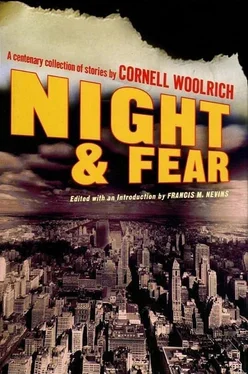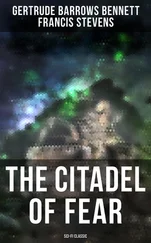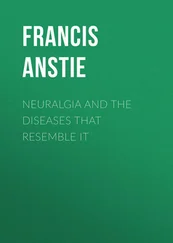There was a deep snarl from below, a sudden rush of heavy feet up the stairs, and the firing went up a flight, retreating along the corridor that led past the room Keogh had hired. The feet came after it, gaining on it. Not a door in the whole ramshackle building opened. Iron bedsteads clashed as bodies ducked blindly under them, and glass popped in one of the unseen front windows as some one sought out without waiting to open it the right way.
A detective suddenly flattened out at the very top of the stairs, as they went up that last flight one by one, but over his prostrate, bleeding form there passed such a withering hail of light flashes, all going the same way, that nothing could have lived in that dead-end corridor afterward.
The one they stumbled over hadn’t. Then they were outside Keogh’s room door, which was open again. But before the foremost of them could get to it, a soft feline voice on the other side of it caterwauled, “Y’ don’t get me!” and a single, final gunshot exploded somewhere inside the room.
The soft-voiced one was folded neatly across the foot of the bed, like a clothespin, when they came in and ringed up around him.
“He didn’t muff,” somebody said sourly. “He should ’a’ done it the day he was born!”
There was somebody else in the room, too — Keogh, his eyes pleading with them for release, lashed to the head of the bed with strips torn from a pillowcase. His shirt had been pulled down from his shoulders without being taken off. There were cigarette ashes all over one shoulder, as though he’d tried to smoke without the use of his hands. Somebody slashed the bonds with a pocketknife, and he folded up and groaned.
“Who are you?” a cop asked.
“I’m the guy that phoned you,” he said faintly.
They straightened him up again. “What’d they do to you?”
He winced, lifted one elbow, and a cigarette butt dropped out of his armpit, where it had adhered. It was out now.
“The works, huh?” some one commented.
“They held my arm down tight.” He showed them a blister the size of a quarter. But he kept writhing, doubling up and straightening out again like a concertina.
“It can’t hurt that much,” one of the detectives said skeptically.
An ambulance had come for the two of their own who had been hurt. The doctor came in to take a look at Keogh after he’d had them carried down.
Keogh kept squirming on the floor while they were trying to question him. One of the detectives was getting sore. “Will ya stay still a minute and answer?” he snarled. “Ya said ya had ’em! The insurance company’s offered a reward, and so has the woman they belonged to. You stand to collect § 5,000 if you hand ’em over of your own free will. Now don’t make me get rough with ya!”
“I wanna hand ’em over!” protested Keogh weakly, “but how can I? I had to hide ’em and I... oooh!” he groaned, unable to continue.
The doctor squatted down to examine him. Keogh groaned something into his ear. The doctor got up again.
“One of you run out and buy a bottle of citrate of magnesia,” he directed. “No wonder he’s got the bends! This man’s got fifteen assorted diamonds in his stomach!”
Afterword to “The Heavy Sugar”
“The Heavy Sugar” ( Pocket Detective, January 1937) is a suspense masterpiece, full of tension and anguish and the look and feel of Depression-era New York, its hunted protagonist flailing through night’s empty canyons, unable to call the police or even to hide in the subways or a flophouse yet wealthier than almost anyone else in the city. It’s a perfect noir situation and, whether he read this particular tale or not, the kind of story that inspired the parallel sequences in Richard Wright’s classic novel Native Son (1940), where the doomed protagonist thrust into a similar urban nightmare is black.
He was on late duty that week, which was why his face was so long as he came down the steps of the precinct house in the middle of all his shift-mates a quarter of an hour before midnight. He hated that late racket — couldn’t get used to it. Midnight to 8:00 A.M. The dregs of time. You had to sleep in broad daylight — try to, you mean, around where he lived. Loaf around all afternoon when other people worked. Didn’t know whether to call it breakfast he ate before he reported in at 11:30 P.M. or midnight-lunch or what.
And such a totally-forsaken beat: Lincoln to Main, Halsted to Spring. Trying store-fronts to make sure they were locked up. Picking them up and putting them down. Ringing the House twice an hour. Then you came off, went home to bed when the rest of the world was waking up. Got up at noon and the whole thing started over once more.
“Cheer up,” Dinty Falvey said at his elbow, “think of all the nice fresh air you get.”
“Every dog has his day,” O’Dare answered. “I’ll be having mine — one of these fine nights!”
They formed a double column on the sidewalk, tramping along two by two. Not in drill-formation by any means, just roughly symmetrical, to avoid ganging up. The two green lamps dwindled to the size of peas behind them, lost themselves in the night-murk. They started thinning out, dropping off one by one to relieve the men going off duty. O’Dare’s beat was the farthest out of them all. “S’long, Danny, see you tomorrow!”
“Right,” said Danny O’Dare, and went on alone. Just a cop. Just a cog in a machine. He reached his beat, opened the call-box, phoned in:
“O’Dare taking over, corner of Lincoln and Rogers.”
Keefer, the man he was relieving, had a drunk on his hands. A drunk and a taxi-driver and an accusing meter. One of the pesty kind of drunks that persecute cops. It’s that way more often than not, public belief to the contrary. A cop loathes running in a drunk, will lean over backward if he can possibly avoid it. For one thing, they’re rarely held the next day, unless they’ve done something particularly overt. For another, it takes up the cop’s time, he’s got to appear to press the charge. It’s a nuisance.
Keefer had a disgusted air, as though this had been going on a good ten minutes or more. “C’mon now,” he said weariedly, “which pocket did you put it in? It must be in there somewhere! Give the man his money.”
The drunk, legs splayed, hat teetering on the back of his head, was digging a thumb into a vest-pocket with somnambulistic slowness. Three or four others had their linings turned inside out. The taxi-driver sat by at his wheel, mum as a clam, aware that the gentry in dark-blue have no great love for his kind.
The drunk pulled the exploring thumb out, smote himself a devastating blow on the chest, bellowed indignantly: “I been robbed!” The dramatic emphasis was too great, he went off balance, sat down abruptly from the effect of his own Tarzan-wallop.
“I got a better idea,” said O’Dare quietly. He picked him up by the feet instead of the collar, held his legs straight up in the air. “Catch his head so it don’t bump,” he warned his brother-officer. “Now, shake!” The drunk began to vibrate like someone with the palsy. Something chinked musically to the sidewalk under him, something else followed; there was a succession of pleasant tinkling metallic sounds.
“Holding out, huh?” Keefer said with feigned ferocity as they stood him up. “I oughta run you in!”
The drunk heaved with exaggerated dignity. “Never wash so insulted in my life!” he glowered.
“Now pay the man and get outa here, before I haul you in!” Keefer took a threatening step forward. The drunk scurried around the corner as though he were worked on pulleys. When Keefer turned to the cab-driver, however, his truculence was no longer assumed, it was the real thing. “Now y’ got paid, get out o’ here, gyp-artist! Y’oughta know better than take on a drunk for a fare in the first place! Don’t lemme see y’ around here no more, chiseler!”
Читать дальше












